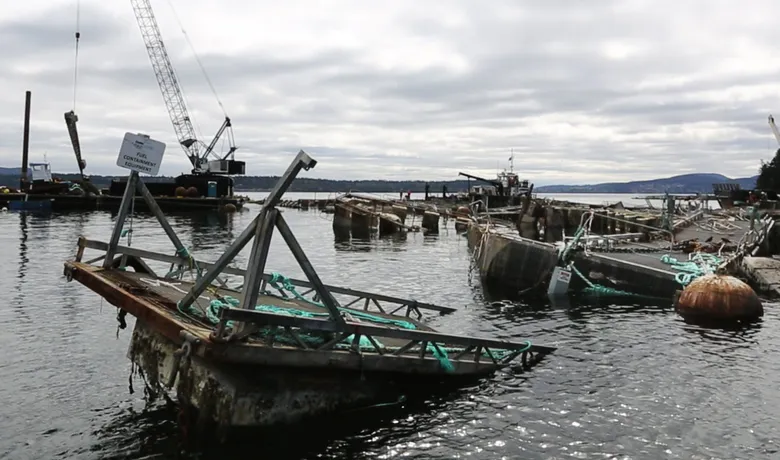
August 25, 2017
Contacts
Kurt Beardslee, Wild Fish Conservancy – (425) 788-1167, [email protected]
Molly Ogren, Wild Fish Conservancy – (425) 788-1167, [email protected]
Patrick Myers, Wild Fish Conservancy – (425) 788-1167, [email protected]
Brian A. Knutsen, Kampmeier & Knutsen, PLLC – (503) 841-6515
On August 24th, 2017, in the wake of an environmentally disastrous event that allowed the escape of up to 305,000 Atlantic salmon into Puget Sound, Wild Fish Conservancy submitted a letter to Cooke Aquaculture Pacific, LLC providing sixty-day notice of intent to file citizen suit under section 505 of the Clean Water Act, 33 U.S.C. § 1365.
As has been widely reported, Cooke Aquaculture presided over the near-complete structural failure of a net pen facility located in Deepwater Bay off of Cypress Island over the weekend of August 19th and 20th, the failure of which has resulted in, and continues to result in, the discharge of farmed Atlantic salmon, dead fish carcasses, and massive amounts of debris among other pollutants. These discharges represent blatantly negligent violations of the National Pollutant Discharge Elimination System (NPDES) permits under which Cooke Aquaculture’s Atlantic salmon net pens currently operate.
Cooke Aquaculture has been quick to attribute the failure of their Cypress Island net pen to unusually high tides associated with the solar eclipse event that took place the morning of August 21st. Wild Fish Conservancy takes several issues with this claim.
The structural integrity of the Cypress Island net pen is reported to have displayed degradation resulting in unlawful discharge as early as August 19th, a full two days prior to the solar eclipse event. Additionally, reporting suggests emergency maintenance was performed on Cypress Island net pens as far back as July 27th, further calling into question the claim that high tides on August 21st were the cause of the net pen facility’s structural failure.
Tidal data collected on Cypress Island the day of the eclipse suggests that tidal fluctuations were well within normal and predictable levels, and that Cypress Island had experienced higher tides during every month of this year prior to those experienced on the 21st. Further competing with Cooke Aquaculture’s claim, tidal fluctuations on the 21st were measured to be lower than those of the 19th and 20th, while those dates also represented data well within the normal range.
Cooke Aquaculture is an international company based out of, and conducting operations within, the Bay of Fundy, a location that sees higher tides and currents than anywhere else in the world. Wild Fish Conservancy is bewildered by the company’s claim that the solar eclipse, an event which showed no recorded impact on tides, presented a tidal occurrence that they could not have prepared for.
The Conservancy is deeply disheartened by Cooke Aquaculture’s glaring negligence, negligence whichhas led to an environmental disaster of epic proportion. The needless escape of up to 305,000 Atlantic salmon into Puget Sound represents a dire threat to already imperiled wild fish populations, beloved marine mammal species, and the fragile Puget Sound ecosystem at large, and Wild Fish Conservancy fears impacts to these critical aspects of our region will be felt for years to come.
“The escapement of Atlantic salmon poses threats of competition to native juvenile and adult salmon and steelhead,” said the Conservancy’s fisheries scientist Dr. Nick Gayeski. “The escaped fish still need to feed and thus are likely to compete with native juvenile Pacific salmon and steelhead, including preying on them. Like Pacific salmon, Atlantic salmon spawn in the fall. The escaped fish are capable of spawning and will begin entering Puget Sound rivers to attempt to spawn. Whether the escaped fish succeed in producing offspring or not, they will compete on the spawning grounds with native salmon, including endangered Puget Sound Chinook, posing a threat to the spawning success of native salmon.”
“This dangerous and reckless industry not only threatens the recovery of our native salmon and orca populations, it threatens the health of Puget Sound and the Northwest’s cultural identity. This disaster needs to be a wake-up call for the public to get involved, and to demand a halt to the expansion of the Atlantic salmon net pen industry into the Straits of Juan de Fuca,” said Kurt Beardslee, Executive Director of the Wild Fish Conservancy.
Earlier this year, Wild Fish Conservancy launched the Our Sound, Our Salmon campaign to halt the expansion of Atlantic salmon net pens in Puget Sound. More information and opportunities for public involvement related to the Our Sound, Our Salmon campaign, including our letter of petition to Governor Inslee, can be found at oursound-oursalmon.org.
###
Wild Fish Conservancy is represented in this matter by Kampmeier & Knutsen, PLLC, of Portland, Oregon and Seattle, Washington
Join our mailing list to recieve important updates on our work, the latest wild fish news, & opportunities to take action to support wild fish.
This site is protected by reCAPTCHA and the Google Privacy Policy and Terms of Service apply.
Wild Fish Conservancy is recognized as a 501(c)3 non-profit by the IRS